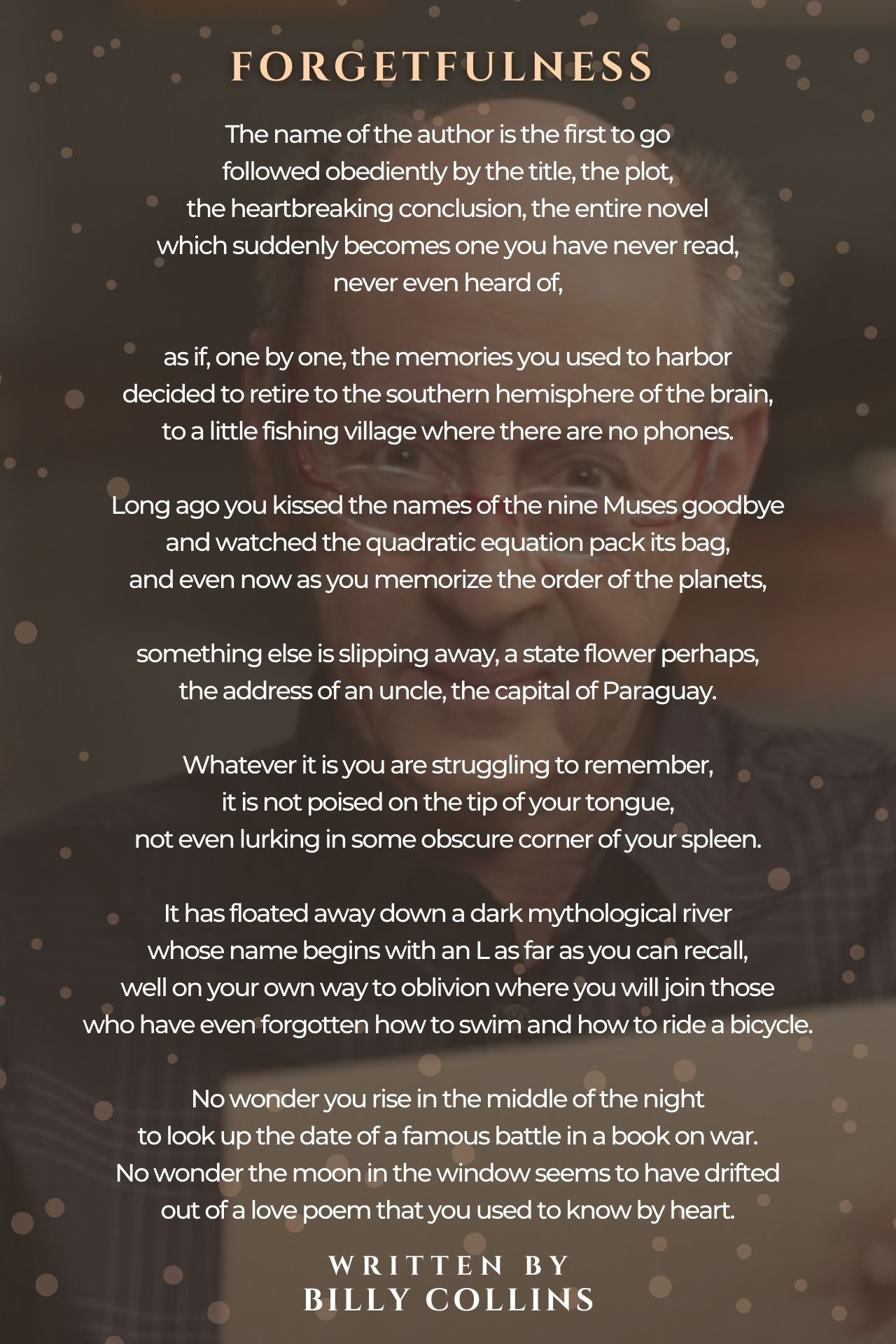Forgetfulness Poem by Billy Collins
Forgetfulness
The name of the author is the first to go
followed obediently by the title, the plot,
the heartbreaking conclusion, the entire novel
which suddenly becomes one you have never read,
never even heard of,
as if, one by one, the memories you used to harbor
decided to retire to the southern hemisphere of the brain,
to a little fishing village where there are no phones.
Long ago you kissed the names of the nine Muses goodbye
and watched the quadratic equation pack its bag,
and even now as you memorize the order of the planets,
something else is slipping away, a state flower perhaps,
the address of an uncle, the capital of Paraguay.
Whatever it is you are struggling to remember,
it is not poised on the tip of your tongue,
not even lurking in some obscure corner of your spleen.
It has floated away down a dark mythological river
whose name begins with an L as far as you can recall,
well on your own way to oblivion where you will join those
who have even forgotten how to swim and how to ride a bicycle.
No wonder you rise in the middle of the night
to look up the date of a famous battle in a book on war.
No wonder the moon in the window seems to have drifted
out of a love poem that you used to know by heart.

Greenwolfe- In this poem, Collins chooses to write free verse as is a growing trend in contemporary poetry, popularized by Walt Whitman. Just because a poem does not have an identifiable rhyme scheme does not mean it is prose. A poet's choice to employ free verse is significant and meaningful in and of itself. furthermore, this poem is rich in metaphor and allusion, particularly to Greek Mythology, concerning the river Lethe (river of forgetfulness in the underworld) , the nine muses whose mother was Mnemosyne (personification of memory) . Also, the progression of memory loss throughout the poem is symbolic of the loss of memory throughout life. This poem is inundated with poetical devices, it merely takes an experienced and knowledgeable reader to fully understand and appreciate its nuanced complexity. Not all poems must end with a life-altering epiphany. This poem is a witty reflection on the nature of human memory loss, and a wonderful contribution by Collins to the world of contemporary poetry.
Collins' poem does not transform. It is entirely denotative, not indirect as Frost said. Collins does not really write poetry at all. He just tells things as they are, and he thinks he makes it poetic through the excessive use of figures and tropes that actually stand out only because they seem to be employed for no purpose beyond themselves. What you call poetical devices look like circus strong men without a circus. And a poem had better reveal something, or it is no poem.
Now I know how it reads a poem written by Professor Eddie Collins. Many times I wanna hold the words that flows so rapidly in this poem, but they constantly continue flowing more rapidly, but it was a nice feel having read this poem by a Professor!
So profoundly written, in a mesmerizing language that I have forgotten that this poem goes about............Forgetfulness. I get such a hilarious feel inside me.
This is ectra ordinary poem about our forgetfulness, the older the worse, methinks, but you have explained here in hemisphere phrases how our mind is working, I have come to the conclusion this is most valuable and most important!
The fist and the last stanzas are particularly beautiful! Heartiest congratulations on the poem’s selection as the ‘Modern Poem of the Day’!
Heart-rending and glorious description of the sad journey of losing one's memory
This poem has not been translated into any other language yet.
I would like to translate this poem
I just heard the name of Billy Collins a few weeks ago, and I thought that at some point I would read one of his better poems before making any comment on him. This is the poem I chose to read and these are my first comments. In the first place, I noticed this was not a poem. It is prose. Second, he decides that the purpose of this is to talk about forgetfulness. So, that is what he does. He says some things about it, but at the end he really has no revelation to convey. His clarity was good for the most part. There are no particular things that one might wish to remember from this piece. Perhaps, he has decided that since things are all going to be forgotten anyway, there is no point in being memorable. If that were the purpose of this piece then it may be remembered. Otherwise, it shall be another victim of its title. GW62
Brilliant, Greenwolfe! I agree entirely. Collins' poetry does not transform. It is mere denotative statement. Even at its best it is only a type of orgiastic descriptiveness. But pretty pictures are not enough without TRANSFORMATION. Frost said poetry is indirect. Collins is so direct, it's almost embarrassing.
That is a strangely uninsightful and bland look at this poem that anyone with sarcasm can make. Try instead to hear him, not be heard. Blessed are the meek for they shall inherit the earth. Matthew 5: 5